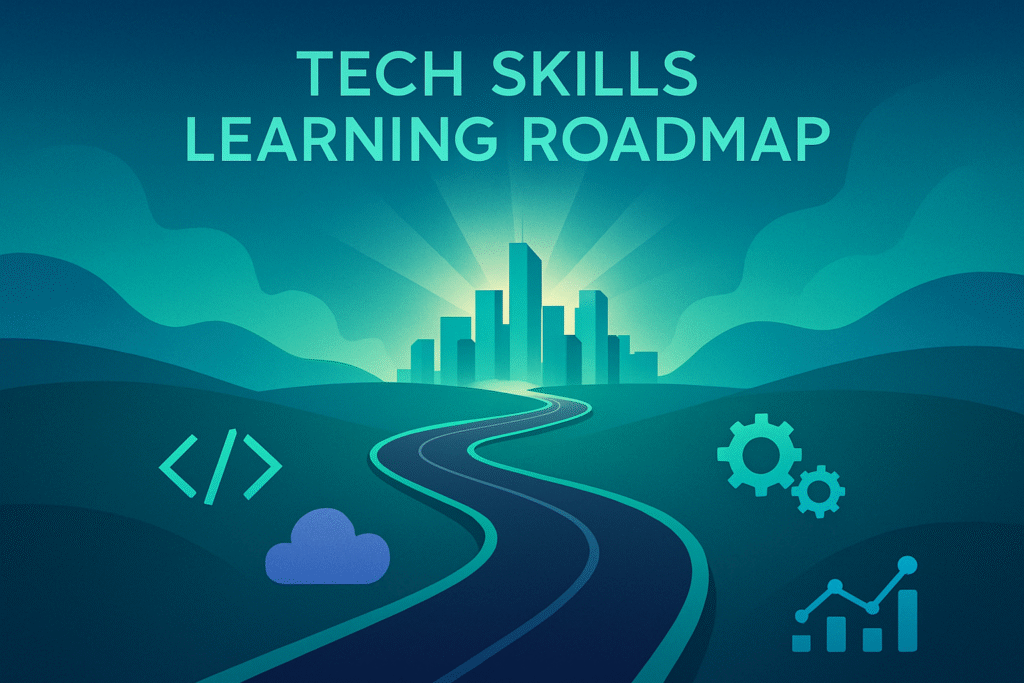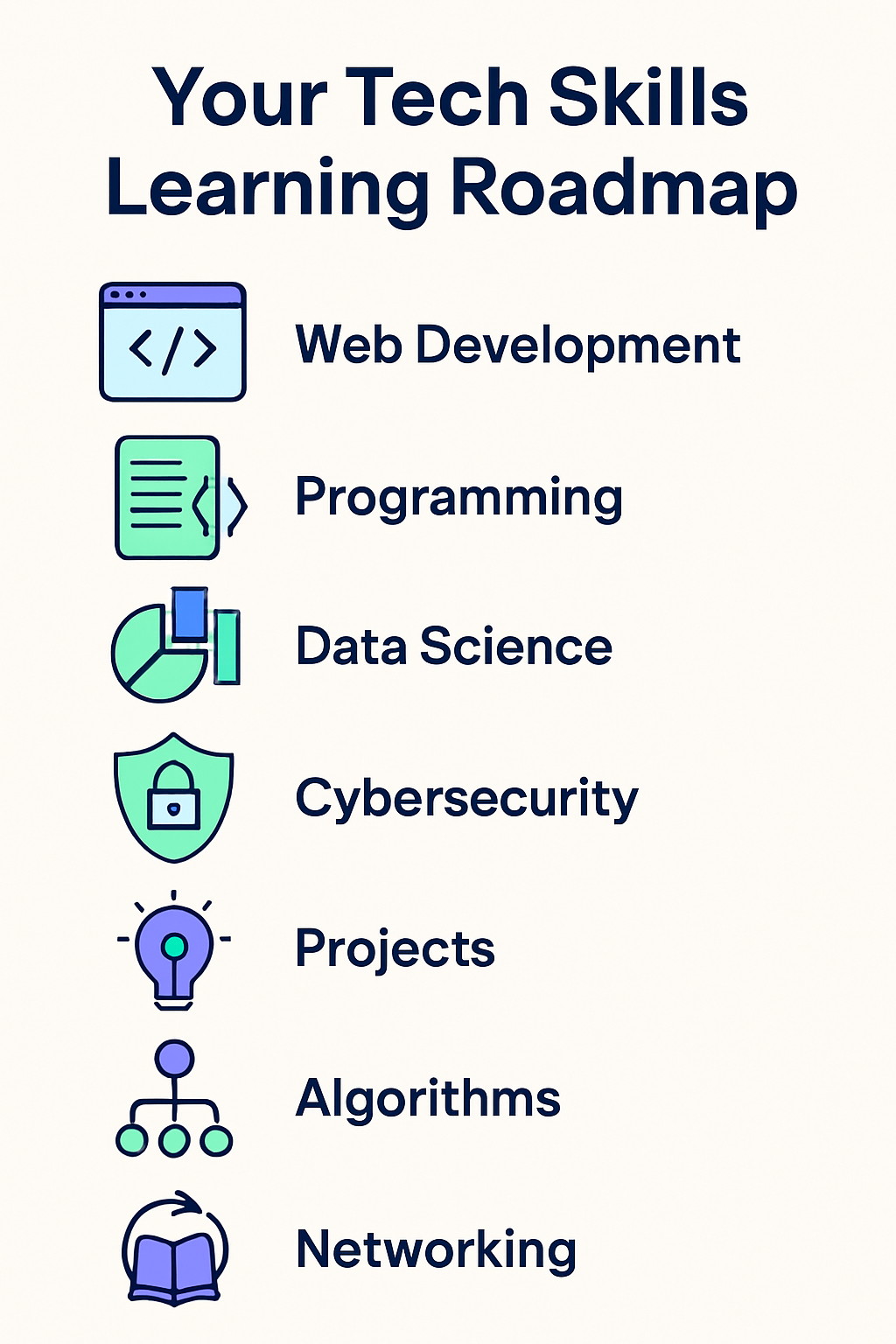
I totally get it. It’s like standing at the foot of a massive mountain, unsure which trail to take.
But don’t worry, I’m here to guide you.
In this blog post,
I’m going to share my ultimate tech skills learning roadmap, designed to help you navigate this exciting landscape and build a truly thriving career.
We’ll explore key tech domains, discuss effective learning strategies, and tackle common challenges head-on. So, let’s embark on this journey together!
Understanding the Tech Landscape: Key Skill Areas
The tech world is vast and ever-evolving, but certain core areas consistently offer high demand and exciting opportunities.
Let’s break down some of the most prominent ones:

Videos are added as random thoughts 💭 💭 💭.
1. Web Development
Web development is often a great entry point into tech, as it’s highly visual and immediately rewarding.
It’s broadly divided into two main parts:
Frontend Development
This is all about what users see and interact with in their browsers.
Think beautiful designs, smooth animations, and intuitive user interfaces. Key skills include:
HTML: The backbone of all web pages.
CSS: For styling and layout.
JavaScript: For interactivity and dynamic content.
Frameworks/Libraries: React, Angular, Vue.js are popular choices that streamline development.
Backend Development
This is the server-side of things, handling databases, server logic, and APIs. It’s the engine behind the scenes that makes everything work. Essential skills here include:
Programming Languages: Python (with frameworks like Django or Flask), Node.js (JavaScript), Ruby (with Rails), Java (with Spring), PHP (with Laravel).
Databases: SQL (PostgreSQL, MySQL) and NoSQL (MongoDB, Cassandra).
APIs: Understanding RESTful and GraphQL APIs.
2. Data Science and Machine Learning
Data is the new oil, and data scientists are the ones who refine it into valuable insights.
Machine learning, a subset of AI, allows systems to learn from data without explicit programming. This field is booming, and key skills include:
Programming Languages Python (with libraries like Pandas, NumPy, Scikit-learn, TensorFlow, PyTorch) and R.
Statistics and Mathematics: A strong foundation in these areas is crucial.
Data Visualization: Tools like Matplotlib, Seaborn, and Tableau.
Machine Learning Algorithms: Understanding supervised, unsupervised, and reinforcement learning.
3. DevOps and Cloud Computing
DevOps bridges the gap between development and operations, focusing on automating and streamlining the software development lifecycle.
Cloud computing, with platforms like AWS, Azure, and Google Cloud, provides scalable and flexible infrastructure.
Skills in this area are highly sought after:
Cloud Platforms: AWS, Azure, Google Cloud.
Containerization: Docker.
Orchestration: Kubernetes.
CI/CD Tools: Jenkins, GitLab CI, GitHub Actions.
Scripting: Bash, Python.
4. Cybersecurity
With increasing cyber threats, cybersecurity professionals are on the front lines protecting digital assets.
This field is critical and constantly evolving. Key areas include:
Network Security: Firewalls, intrusion detection systems.
Application Security: Secure coding practices, vulnerability assessment.
Identity and Access Management (IAM): Authentication, authorization.
Incident Response: Handling security breaches.
Compliance: Understanding regulations like GDPR, HIPAA.
5. Mobile Development
Mobile apps are an integral part of our daily lives.
If you’re passionate about creating applications for smartphones and tablets, consider:
Native Development: Kotlin/Java for Android, Swift/Objective-C for iOS.
Cross-Platform Development: React Native, Flutter, Xamarin.
6. Other Emerging Areas
The tech landscape is always expanding. Keep an eye on:
Blockchain: Decentralized ledger technology.
AI Engineering: Building and deploying AI systems.
Game Development: Unity, Unreal Engine.
Technical Writing: Communicating complex technical information clearly.
UX/UI Design: User experience and user interface design.
Navigating Your Learning Journey: Effective Strategies
Learning tech skills isn’t just about what you learn, but how you learn it.
Here are some strategies that have worked wonders for me and countless others:
1. Start with the Basics and Build Solid Foundations
It’s tempting to jump straight into the latest hot technology, but trust me, a strong foundation in computer science fundamentals, data structures, and algorithms will pay dividends in the long run.
These core concepts are transferable across different technologies and will make learning new things much easier.
2. Learn by Doing: Projects, Projects, Projects!
Reading books and watching tutorials are great for understanding concepts, but true learning happens when you apply that knowledge. Build projects, even small ones.
This is where you’ll encounter real-world problems, debug code, and solidify your understanding. Your projects also serve as a portfolio to showcase your skills to potential employers.
3. Leverage Online Resources and Communities
The internet is a treasure trove of learning resources.
Websites like freeCodeCamp,
Coursera, Udemy, and edX offer structured courses.
Don’t forget platforms like Stack Overflow, Reddit communities (like r/learnprogramming, r/ExperiencedDevs), and GitHub for collaborative learning and problem-solving.
Engage with these communities; ask questions, answer others, and learn from shared experiences.
4. Embrace Continuous Learning and Adaptability
The tech industry moves at lightning speed.
What’s cutting-edge today might be legacy tomorrow.
Cultivate a mindset of continuous learning.
Stay curious, read tech blogs, follow industry leaders, and be open to learning new tools and technologies.
Adaptability is your superpower in this dynamic field.
5. Seek Feedback and Mentorship
Don’t learn in isolation. Share your projects with others, ask for code reviews, and be open to constructive criticism.
If possible, find a mentor who can guide you, share their experiences, and provide valuable insights.
Their wisdom can save you a lot of time and frustration.
6. Break Down Complex Topics
Large, complex topics can feel overwhelming.
Break them down into smaller, manageable chunks.
Focus on mastering one concept or skill at a time before moving on.
This approach makes the learning process less daunting and more effective.
Overcoming Common Challenges
Let’s be real, the journey won’t always be smooth sailing.
You’ll face challenges, but knowing them beforehand can help you prepare:
1. Information Overload
With so much information available, it’s easy to feel overwhelmed.
My advice? Stick to a structured learning path initially.
Don’t try to learn everything at once. Focus on one area, master it, and then expand.
2. Imposter Syndrome
This is a big one in tech. You might feel like you’re not good enough, or that everyone else knows more than you.
Remember, everyone starts somewhere. Celebrate your small victories, acknowledge your progress, and understand that learning is a continuous process. You belong here!
3. Debugging Frustration
Code rarely works perfectly on the first try.
Debugging can be frustrating, but it’s an essential skill.
Learn to use debugging tools effectively, break down the problem, and don’t be afraid to take a break and come back with fresh eyes.
4. Staying Motivated
Learning can be a marathon, not a sprint.
Set realistic goals, track your progress, and reward yourself for milestones.
Connect with other learners, join study groups, and remind yourself why you started this journey in the first place.
Conclusion
Embarking on a tech skills learning roadmap is an incredibly rewarding journey.
It requires dedication, perseverance, and a willingness to embrace continuous learning.
By understanding the key skill areas, adopting effective learning strategies, and preparing for common challenges,
you’re well on your way to building a successful and fulfilling career in technology.
Remember, every expert was once a beginner.
So, take that first step, stay curious, and enjoy the ride!
The tech world is waiting for you.
Building Your Portfolio and Networking
Beyond just learning the skills, actively building a portfolio and networking are crucial for landing your dream job in tech.
Think of your portfolio as your visual resume, showcasing your abilities and passion.
It’s not just about listing skills; it’s about demonstrating them through tangible projects.
Start with small projects, even tutorials, and then gradually build more complex applications.
Share your code on platforms like GitHub, and write about your learning process and challenges on a personal blog or LinkedIn.
This not only solidifies your understanding but also makes you visible to potential employers.
Networking, on the other hand, is about connecting with people in the industry.
Attend virtual meetups, webinars, and conferences.
Join online communities and engage in discussions.
Don’t be afraid to reach out to professionals on LinkedIn for informational interviews.
You’d be surprised how willing people are to share their experiences and offer advice.
Remember, many job opportunities come through referrals, so building genuine connections can open doors you never knew existed.
Deep Dive into Emerging Areas
Let’s expand a bit on some of those exciting emerging areas I mentioned earlier,
as they represent the future of tech and offer incredible opportunities for innovation and growth.
Blockchain Technology
Blockchain is more than just cryptocurrencies;
it’s a decentralized, distributed ledger technology with applications across various industries, from supply chain management to healthcare.
Understanding concepts like smart contracts, consensus mechanisms, and decentralized applications (dApps) can position you at the forefront of this transformative technology.
Learning Solidity (for Ethereum) or Rust (for Solana) are great starting points.
AI Engineering
While data science focuses on analyzing data and building models, AI engineering is about taking those models and deploying them into production systems.
This involves skills in MLOps (Machine Learning Operations), cloud deployment, and building robust, scalable AI applications.
It’s the bridge between theoretical AI and real-world impact.
Game Development
If you have a passion for creating interactive experiences, game development might be your calling.
This field combines programming, art, and design.
Popular engines like Unity (C#) and Unreal Engine (C++) provide powerful tools for building everything from mobile games to AAA titles.
It’s a challenging but incredibly creative and rewarding path.
Technical Writing
Often overlooked, technical writing is a vital skill in the tech industry.
As technology becomes more complex, the need for clear, concise, and accurate documentation grows.
Technical writers bridge the gap between developers and users, explaining intricate concepts in an understandable way.
Strong writing skills, attention to detail, and a solid grasp of technical concepts are key.
UX/UI Design
User Experience (UX) and User Interface (UI) design are about creating intuitive and enjoyable digital products.
UX designers focus on the overall user journey, while UI designers concentrate on the visual and interactive elements.
This field requires empathy, creativity, and an underst
anding of human-computer interaction principles.
Tools like Figma, Sketch, and Adobe XD are essential.
Thanks
